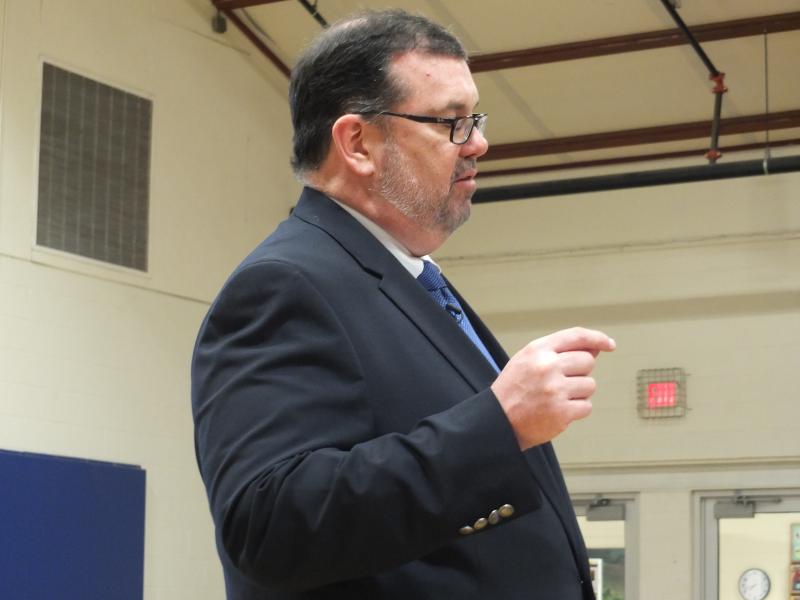About 70 people attended a meeting at the Boothbay Region YMCA April 26, to learn more about how the legalization of recreational marijuana will affect the Boothbay Harbor area.
Edward “Ted” Kelleher was the featured speaker. Kelleher is a business and real estate lawyer with the law firm Drummond Woodsum in Portland. He heads the firm's regulated substances practice group, focusing on consumer product industries that require regulatory oversight, such as brewing, distilling, and now, the emerging marijuana business in Maine.
Boothbay Harbor Board of Selectmen Chair Denise Griffin introduced Kelleher, who explained to the audience how he became interested in the marijuana industry. “I don't want you to think I'm living some Downeast Breaking Bad fantasy,” he said. “My firm was getting questions from people interested in getting into the marijuana business.” Kelleher and his colleagues realized a wave of pro-legalization sentiment would hit Maine, and when it did, people would need help understanding the laws and regulations surrounding what would become a new industry offering new opportunities.
And those laws are complex. In November 2016, Maine joined seven other states and the District of Columbia when it narrowly passed the legalization of recreational marijuana. “That does two things. It legalized possession and use of marijuana for people over 21, and it created a framework for a state-licensed and regulated commercial system for cultivation and sale,” Kelleher said.
However, it is still illegal under federal law, Kelleher said. “Every owner or operator of a marijuana business is committing federal felonies every day they go into their business.” But when the states of Colorado and Washington legalized the recreational use of marijuana, the Obama administration issued policy guidance to federal prosecutors to adopt a cautious hands-off policy, as long as those businesses operated in a legitimate manner from the perspective of state laws.
In Maine, it is now legal to have and use recreational pot. Marijuana use has to take place in a private dwelling, out of sight. It's legal to have 2.5 ounces, and up to six plants can be grown at home. It cannot be smoked in a public area, such as a park. It cannot be purchased at a store, yet. “The retail market is being created by a combination of legislative action and regulatory agencies. That's going to be a long process,” Kelleher said.
But the wait for those wanting to get into the marijuana industry could be worth it, economically. Keller explained that nationally, the sale of marijuana-related products and paraphernalia could be a business of $24-$44 billion by 2020. In Maine, Kelleher said, the recreational market could reach $210 million by 2020. He compared it to the lobster industry, which in 2016 reached $490 million. “Marijuana is not the biggest or most important industry in the state, but it is still a sizeable one with a lot of money to be made,” Kelleher said.
So how can municipalities take advantage of this potentially lucrative industry? Or, if they want nothing to do with it, how can they opt out? Some municipalities have already made decisions.
Southport Island has voted to become a “dry” town. Edgecomb selectmen recently removed a proposed town meeting warrant article restricting legal uses for recreational marijuana because residents had complained that those applying for retail licenses would be commercially disadvantaged. It also was noted that a statewide moratorium is in place until Feb. 1, 2018.
Boothbay Harbor is taking its time. As the state legislature and a joint marijuana legalization implementation committee work to establish laws and regulations, the town is learning all it can about the complexities of the industry.
Five classes of recreational marijuana licenses are available: Cultivation, manufacturing, testing, retails stores and social clubs. At about five square miles, Boothbay Harbor is probably too small to consider licenses for the first three, which require large areas. That leaves retail stores and social clubs. Regarding the time it will take to propose zoning ordinances and regulations, Griffin said, “The law is more complicated than we thought. It will take research to determine how many licenses to grant and what kind of criteria to consider. It will take more discussion to determine how to proceed.”
Kelleher said municipalities have a lot of local control over what they will or won't do. “Voters gave towns a lot of power on how to regulate marijuana businesses. The legalization says towns can pose rules more onerous than states,” he said, but he admitted municipalities don't have much guidance on how to make those decisions. He said there were consultants trained to help towns determine how many marijuana-specific businesses would benefit them, if any.
Selectman Wendy Wolf has heard Kelleher speak several times on the topic of marijuana. “Each time there are changes and information updates and advice to municipalities for a prudent course. This is a dynamic issue and towns need to be very deliberative before acting,” she said.
The towns will probably have time to deliberate, even after the state moratorium is lifted. “There's a lot of work to be done before someone gets a piece of paper that says you now have a license to sell marijuana on Main Street. Realistically, it could be as late as early 2019,” Kelleher said. “We're going to have a year and a half to two years before we see a flourishing market for recreational marijuana.”





























